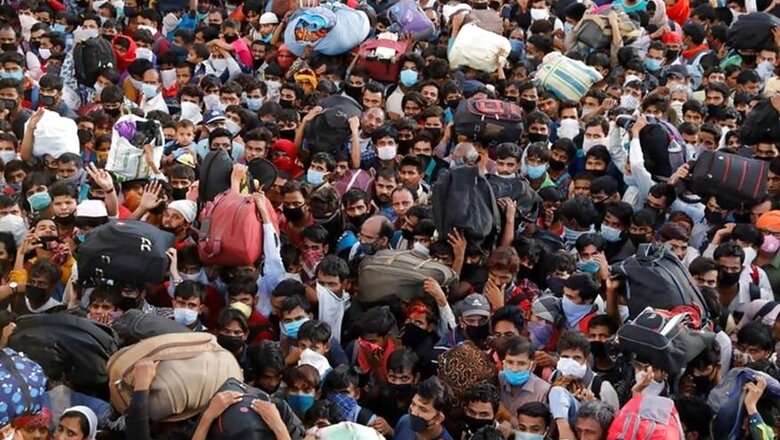
views
In human history, there has never been a time when the world went put 2 billion humans under a lockdown. This is unprecedented, and so will be the consequences. We are in a crisis that is reminiscent of what happened in the Great Depression of the 1930s and the recession of 2008 - COVIDEPRESSION.
We were unprepared for the arrival of COVID-19 and we seem to be unprepared for the aftermath. When the world wakes up after the lockdown, it would be a new reality to face. It goes without saying that anything you do for 21 days becomes a habit. So, for sure, many of our habits will be forgotten, and many made post this lockdown. For sure, the print media will have to reinvent itself.
We have seen that the 2008 recession led to rationalisation in the corporate world and it became more conservative. Business-class travel was restricted for top executives with more meetings going online and pruning the staff and office. After this lockdown, we can expect that going to a new level. We can certainly look forward to a few roles being converted into 3-4 days a week, moving to smaller offices and non-routine work moving to WFH. Needless to mention, some roles will become redundant.
The government must focus on some key issues to prepare India for a new reality.
Unorganised workers: It is estimated about 40 crore workers are in the unorganised sector and about 12 crore are migrant workers.
With COVID-19, the three issues have come up for these unorganised workers. There is a challenge before the Centre for migrants moving back to their home states. For the state governments, the intra-state migration will be a challenge, and for the nation, getting back the labour to work in MSMEs, factories, and agriculture post-COVID will need efforts on a war footing.
A few important sectors are totally dependent on migrant workers like construction (>50 million), domestic work (>20 million), textiles (>11 million ), brick kiln (>10 million ), transportation, roadside vendors and stall owners, retailers, mines, and quarrying. So, the issue is going to be more challenging then we can think.
In the absence of these workers, there will be a prolonged closure of these industries. Productivity and working capital will be impacted, and for MSMEs, it will lead to the collapse of these sectors due to lack of availability of workers will and will have a cascading impact on the economy.
Overall, those who can afford will automate. This will put a question mark on the long term growth. Following states which provide migrant workers will need a special scheme to cope up with COVIDERESSION -- Uttar Pradesh, Bihar, Madhya Pradesh, Odisha and Rajasthan. Else, the collateral loss to Centre and states will be unbearable, and though, for the time being, there will be an uptick in terms of sales of daily essentials in rural India due to mass migration, but overall, it will negatively impact the sales volume and bring down the GDP by about 1%-2%.
Joblessness, salary and bonus cut: Telangana, Maharashtra government, and the airline industry have resorted to massive salary cuts, and this is spreading to other sectors like healthcare and retail. When the income becomes less, the spending will go down. This is likely to bring down the GDP by about 1%-2%. Total job losses in the extreme case are estimated to be Rs 13.6 crore.
Bankruptcy, NPAs and Tax collection: It is a foregone conclusion that businesses will close down due to various factors. Mostly, these will be the medium and small enterprises that survive on monthly billing. Two months of negative growth means massive financial defaults; add to this, the loss of workers ( migrants) and rentals and salaries, and bear in mind that these businesses work on meagre margins. MUDRA loans becoming NPAs is something the government should factor in planning. MSMEs, which should have been any country's strength for creating an inward-looking robust domestic sector, are staring at an existential crisis. The government, through the ministry of MSME, immediately gives them financial support for a quarter, at least, along with a line of credit like it does for exporters. Needless to say, all taxes be waived for a quarter.
Healthcare remains the neglected child despite all the hoopla. The budget for the national insurance scheme was cut down by 50% recently. A rough working on the numbers means that for a 5 lakh coverage per family with a budget of Rs 6,400 crore, the number of beneficiaries will be less than 1,28,000 in a scheme intended for 550 million. In this, I have not factored the money spent on other activities like scheme promotion and other administrative overheads related to the scheme.
Also, mental health cases will see a tremendous rise in due to COVIDEPRESSION, and the migrant workers will add to a load of rural healthcare. It is time for the government to revive the 'doctor on call' project initiated in 2016 by MOHFW and aggressively implement digital health (mobile health in particular) to address this challenge.
Also, the franchisees of AMRUT and Jan Aushadhi be financed under MUDRA scheme and expanded. Given the shortage of psychiatrists, it will be prudent to use an AI-backed decision support system and allowing the GPs to handle mental health cases. Also, country post the lockdown must mandatorily implement mass masking (wearing masks) as the spread happens through the droplets. It is common sense. Also, textile ministry must immediately get to making adequate masses and prop up the industry and manual workers. We have no time to lose.
Households: There are 12.7 crore low-income households (earning less than $4000 a year) in India, and this is where the country's focus should be to keep the economy ticking. They need to be provided for free ration for 6-12 months and give them 'work and upskilling allowance' under NREGA to train them and make them future-ready. India will need to keep its growth above 6% to keep the dollar inflows and investors interested in India plus, it is the key for survival for the significant segment of the population. With 19.7 million births every year, which are all tracked by ASHAs, these households need a comprehensive plan of care. If needed, time to take back a part of the RBIs reserve to fund these families. Else, crimes and social unrest may increase.
Administration and Accountability: With COVID, a few things became apparent, a country like India cannot sustain with the old age imperial bureaucratic system. It failed to act on time, and in a manner which would have helped cope with COVID. Deaths in Jaipur and Gorakhpur of 100s of kids for want of ventilators in the past few months did not shake the bureaucracy to act, and it was a signal that worse may be in the offing. In fact, all states should have procured adequate ventilators after Rajasthan and UP faced infant deaths. The media should have kept the bureaucracy on the toes. Still, it failed in its duty, knowing well that today, media perceptions are more valued than the lives of people! Bureaucracy and police reforms have to be done at the earliest. Else India will have to give up its lofty goals of development, and failure to handle issues listed above will have a show in the 2024 elections.
Institutions funded by the public have to show outcomes and be accountable. We are seeing in COVID how multiple agencies are acting without coordination. On one side, we have a shortage of PPE, and on the other side, we are exporting PPE! The same happened during the increase in the price of onion etc. India needs to use predictive models in such times. Instead of creating a war room, we are creating committees full of bureaucrats. In the 11 empowered committees, Secretary - Health Research, Secretary - Science and technology, and the Drugs Controller General of India was missing. Are we seriously expecting such committees to deliver or just to ensure that committees take the blame and no senior bureaucrat faces the brunt?
Automation, financing, and telecommunication sector may see an uptick due to increase demand but these are not job intensive sectors. The stock prices are getting hammered. MCA must ensure that the cash-rich corporates and investors don't buyback/buy shares to profiteer from this crisis. It was shocking to see that while YES Bank was shut, its stock was being traded, and people made money. This is uncalled for at the time of crisis, where the retail investors lost, and FIIs and big pockets made money! Regulators failed in their duty, and it's unacceptable.
The world order is reset. India's relations with the western world need a new paradigm along with its relations with its immediate neighbours to ward off any sinister designs from expansionist powers. I am sure it is not the end of globalization. Still, all countries will have to focus on building robust domestic economies.
The Prime Minister was futuristic when he started Jan Dhan accounts, Swachh Bharat scheme. This is the time to give such programs a new meaning coupled with cooperative federalism.
With the epicentre of COVID moving from Wuhan to Italy to New York, we don't know of the next stop. We must be prepared if this is in Delhi or Mumbai.
India has been pushed back by at least two years in terms of growth and development, and this is not the time for business as usual. We need a drastic change on all fronts. Financially, the government must 'infuse to circulate' money in the system so that it creates a cycle effect of 'buying-selling-producing' through a bottom-up approach.
The government will have to focus on bolstering intensive job sectors. The outcome of COVID is that India has stood together in the time of this crisis. We must stay together cohesively to support and rebuild what we have lost. We need to redesign our new system, which is always in a state of readiness to cope with the likes of COVID or in case there is biological warfare. COVID has served as a reality check and a call to action for governments and the citizens. It has made us realize that massive defence budgets serve no purpose when the enemy is invisible. The definition of war and warfare is changed altogether in the new world. We have to fight a prolonged war, together forgetting all differences.
(Professor Rajendra Pratap Gupta is a leading public policy expert and a former advisor to the central government. Views are personal.)


















Comments
0 comment